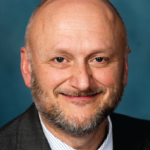“Without a doubt, seeing our patients get worse and addressing their disappointment are serious stressors, and learning resilience and communication skills can help,” says Joseph Rotella, MD, chief medical officer of the American Academy of Hospice and Palliative Medicine.

Dr. Rotella
Dr. Rotella suggests a couple of additional resources that rheumatologists may find helpful. One is the National Academy of Medicine’s Action Collaborative on Clinician Well-Being and Resilience. Another is VitalTalk, a National Institutes of Health-funded training curriculum and educational resource designed to help doctors and other professionals learn better communication skills, disclose serious news to patients, address the patient’s goals of care, establish better rapport, and track and respond to emotions that come up.
“HPM doctors face death, suffering and uncertainty all the time and have to learn to be okay around uncomfortable feelings,” Dr. Rotella says. “But we are not necessarily any more immune than other specialties to burnout, guilt and regret when things don’t go as well as we had hoped.”
Larry Beresford is a freelance medical journalist in Oakland, Calif.
References
- Stuart MR, Lieberman, JA. The Fifteen Minute Hour: Therapeutic Talk in Primary Care, fifth edition. Boca Raton, Fla.: The CRC Press, 2015.
- Salyers M, Bonfils KA, Luther L, et al. The relationship between professional burnout and quality and safety in healthcare: A meta-analysis. J Gen Intern Med. 2017 Apr;32(4):475–482.
- Eng J, Schulman E, Jhanwar SM, Shah MK. Patient death debriefing sessions to support residents’ emotional reactions to patient deaths. J Grad Med Educ. 2015 Sep;7(3): 430–436.


